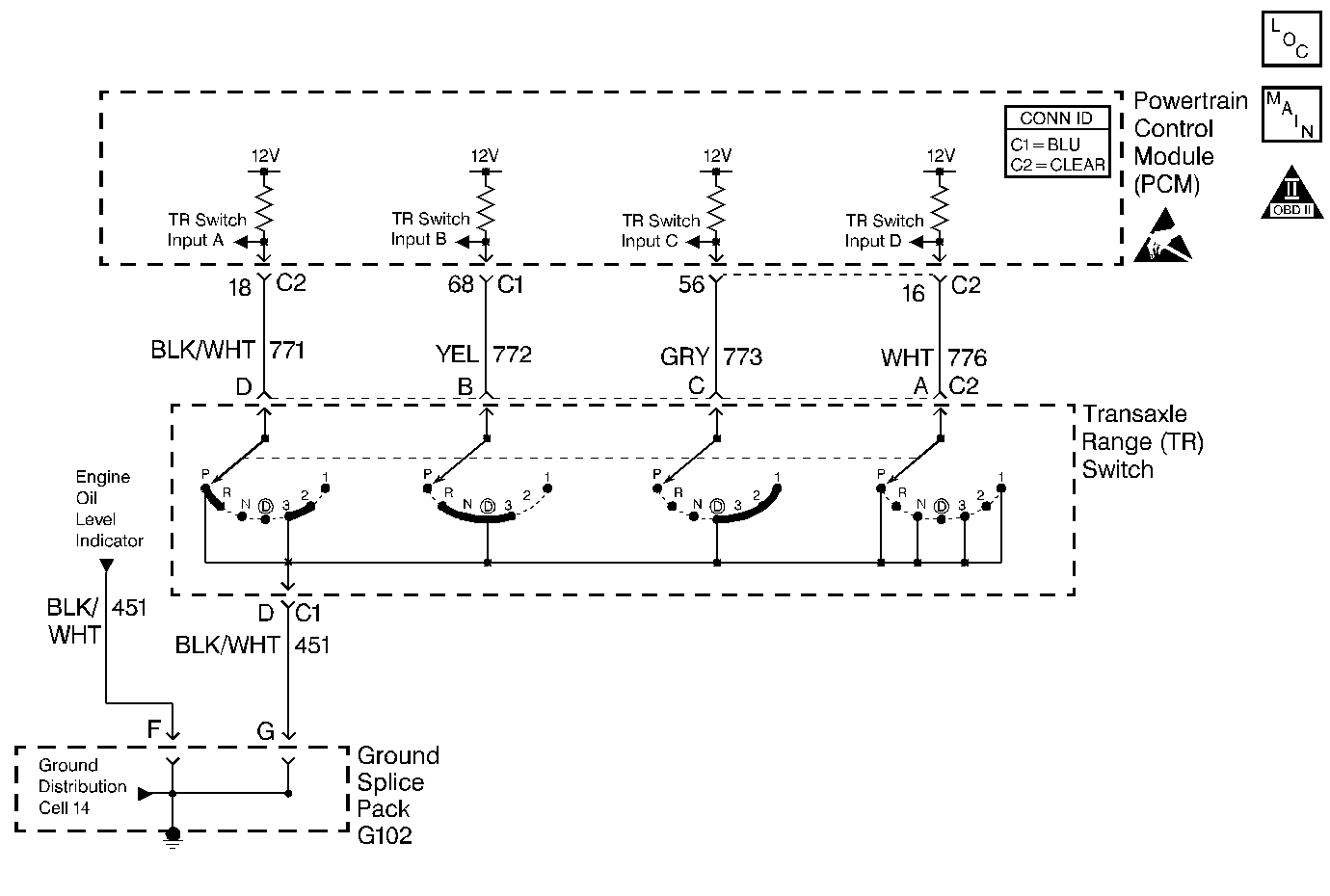
Circuit Description
The Transaxle Range Switch is part of the Transaxle Park/Neutral Position (PNP) switch mounted on the transaxle manual shaft. The four inputs from the transaxle range switch indicate to the PCM which position is selected by the Transaxle selector lever. This information is used for ignition timing, EVAP canister purge, EGR and IAC valve operation.
The combination of the four transaxle range input states determine the PCM commanded shift pattern. The input voltage level at the PCM is high (B+) when the transaxle range switch is open and low when the switch is closed to ground. The state of each input is represented on the scan tool as X=high voltage level, 0=low voltage level. The four parameters represent transaxle range switch Parity, A, B, and C inputs respectively.
Gear Selector Position | Scan Tool Trans Range PABC Display X=High 0=Low | |||
|---|---|---|---|---|
P | A | B | C | |
Park (P) | 0 | 0 | X | X |
Reverse (R) | X | 0 | 0 | X |
Neutral (N) | 0 | X | 0 | X |
Drive4 (OD) | X | X | 0 | 0 |
Drive3 (3) | 0 | 0 | 0 | 0 |
Drive2 (2) | X | 0 | X | 0 |
Drive 1 (1) | 0 | X | X | 0 |
Conditions for Setting the DTC
The Transaxle Range Switch inputs indicate an invalid combination for longer than 10 seconds.
Action Taken When the DTC Sets
| • | The PCM will not illuminate the malfunction indicator lamp (MIL). |
| • | The PCM will store conditions which were present when the DTC set as Failure Records data only. This information will not be stored as Freeze Frame data. |
Conditions for Clearing the MIL/DTC
| • | A History DTC will clear after 40 consecutive warm-up cycles have occurred without a malfunction. |
| • | The DTC can be cleared by using the scan tool Clear Info function. |
Diagnostic Aids
Check for the following conditions:
| • | Poor connection at PCM. Inspect harness connectors for backed out terminals, improper mating, broken locks, improperly formed or damaged terminals, and poor terminal to wire connection. |
| • | Damaged harness. Inspect the wiring harness for damage. If the harness appears to be OK, observe the Transaxle Range A/B/C/P switch display on the scan tool while moving connectors and wiring harnesses related to the sensor. A change in the display will indicate the location of the fault. |
Important: Vehicle should not be driven with transaxle range switch disconnected, as idle quality will be affected.
Reviewing the Fail Records vehicle mileage since the diagnostic test last failed may help determine how often the condition that caused the DTC to be set occurs. This may assist in diagnosing the condition.
Test Description
Numbers below refer to the step numbers on the Diagnostic Table:
Step | Action | Value(s) | Yes | No |
|---|---|---|---|---|
1 | Was the Powertrain ON Board Diagnostic System Check performed? | -- | ||
2 |
Does scan tool Trans Range PABC display the specified values? | P=0 A=0 B=X C=X | ||
3 |
Does the scan tool display match the Transaxle Range Switch Valid Input Combinations table in each gear position? | -- | Go to Diagnostic Aids | |
4 | Does scan tool Trans Range PABC display the specified values? | P=0 A=0 B=X C=X | ||
5 |
Was a problem found? | -- | ||
6 |
Was a problem found? | -- | ||
7 | Does scan tool Trans Range PABC display the specified values? | P=0 A=0 B=X C=X | ||
8 |
Does scan tool Trans Range PABC display the specified values? | P=0 A=0 B=X C=X | ||
9 |
Was a problem found | -- | ||
10 |
Was a problem found? | -- | ||
11 |
Was a problem found? | -- | ||
12 |
Is the test lamp ON when the input should equal 0 and OFF when the input should equal X? | -- | ||
13 |
Was a problem found? | -- | ||
14 | Replace the Transaxle range switch. Refer to Park/Neutral Position Switch Replacement in Automatic Transaxle 4T40-E. Is the action complete? | -- | -- | |
15 |
Was a problem found? | -- | ||
Replace the PCM. Important: The replacement PCM must be programmed. Refer to Powertrain Control Module Replacement/Programming . Is the action complete? | -- | -- | ||
17 |
Does the scan tool display match the Transaxle Range Switch Valid Input Combinations table in each gear position? | -- | System OK |
